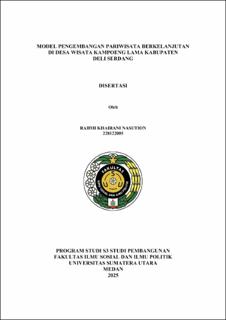Model Pengembangan Pariwisata Berkelanjutan di Desa Wisata Kampoeng Lama Kabupaten Deli Serdang
Sustainable Tourism Development Model in the Kampoeng Lama Tourism Village Deli Serdang Regency

Date
2025Author
Nasution, Rahmi Khairani
Advisor(s)
Harahap, R Hamdani
Kurniawati, Dewi
Ridho, Hatta
Metadata
Show full item recordAbstract
Sustainable development is a developmental process that aims to enhance economic growth, maintain environmental sustainability, and uphold social wellbeing for the benefit of both present and future generations. The involvement of multiple stakeholders is facilitated through the collaboration of available resources. This study aims to analyze sustainable tourism development in Kampoeng Lama Tourism Village by focusing on village potential, tourist characteristics, sustainable tourism development, and the development model employed. The research uses a mixed-method approach, combining quantitative and qualitative methods, with data collected through interviews, observations, documentation, questionnaires, and focus group discussions (FGDs). The findings reveal that the village has three main tourist attractions: PASAR KAMU, Paloh Naga Agrotourism, and Sanggar Lingkaran. The majority of visitors are unmarried males aged 18-24 years, predominantly of Javanese ethnicity, holding diploma-level education, working as students, residing within 20-30 km from the tourism site, traveling with family by motorcycle, and seeking tranquility. The village's sustainability level is categorized as "fairly sustainable" with a score of 74.76, comprising an economic dimension score of 75.7 (sustainable), an environmental dimension score of 75.23 (sustainable), and a social dimension score of 73.37 (fairly sustainable). The tourism development model implemented adopts a collaborative governance approach involving various stakeholders, including academics who empower local communities and students, banking institutions providing CSR support, communities, the government, and the media. The FGD results emphasize the need for innovation and improved service quality to encourage return visits to Kampoeng Lama Tourism Village. The novelty of this research lies in the development of the SI CANTIK Model (potenSI [Potential], Characteristic [Characteristics], ANgkat Local Champion [Empower Local Champions], fasiliTasI [Facilitation], Kolaboratif Governance [Collaborative Governance]) as a framework for sustainable tourism development in Kampoeng Lama Tourism Village, Deli Serdang Regency.
